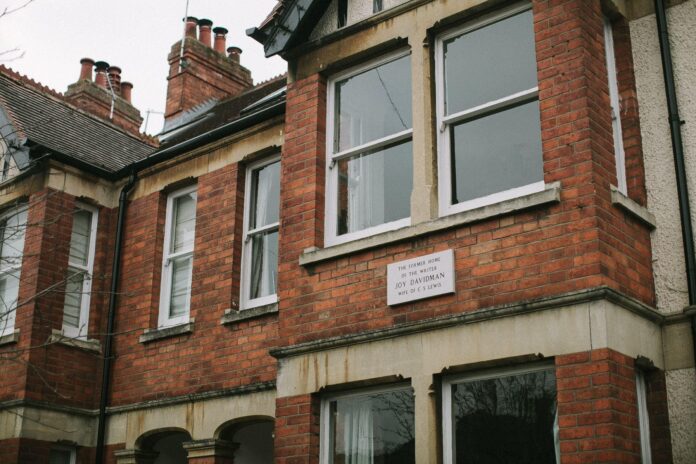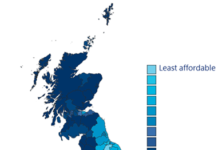Research reveals the regions where eco and budget-conscious Brits can find the most energy efficient properties.
The experts at Quotezone.co.uk have named which areas around England and Wales are best for those who are looking for economical homes.
Many households are facing the burden of high energy costs, largely due to the fact that their homes are not energy efficient enough and a lot of heat is lost through poor insulation.
Energy efficiency is rated on a scale of A to G – A being the highest grade and G being the lowest.
England and Wales both have a median energy efficiency rating in band D, with scores of 67 and 65, which is generally acceptable but means that there is room for improvement.
The most energy efficient areas are South East and London, both with a score of 68.
London’s lack of houses and volume of flats contributes to its energy efficiency rating, as flats and maisonettes are the most energy efficient property type according to research.
North East, South West and East of England have also performed well, following closely behind the top two with only a one-point difference and a score of 67.
The next regions on the list are West Midlands, East Midlands, and North West and at the bottom of the list with the least energy efficient homes are Wales and Yorkshire and The Humber.
In general, areas with more new-builds and flats are more energy-efficient than areas with older homes.
The EPC rating corresponds to the government’s Standard Assessment Procedure (SAP) scores, from 1 to 100 – helping homeowners understand the effectiveness of the heating and hot water system, the lighting and even the construction of the building. It also shows the potential the property has to move up to a higher band and become more energy efficient.
Although band D is the UK average, the government has set a target for all properties to move up to band C by 2035 – creating savings of approximately £300 a household.*
| UK REGION | ENERGY EFFICIENCY |
| South East | 68 |
| London | 68 |
| North East | 67 |
| South West | 67 |
| East of England | 67 |
| England | 67 |
| West Midlands | 66 |
| East Midlands | 66 |
| North West | 66 |
| Wales | 65 |
| Yorkshire and the Humber | 65 |
*Band D, 55-68
Band C, 69-80
Greg Wilson, Founder and CEO of Quotezone.co.uk said: “With energy costs on the rise, many homebuyers consider the EPC rating of a property as one of their main priorities.
“Not only does it save money on bills, but it also reduces our carbon footprint.
“When planning a move, the energy efficiency rating is really important, try to get a property as close to an A band as possible, to save yourself money in the long run – these tend to be newer properties.
“However, even if you have an older house there are steps that can be taken to improve its energy efficiency, for example adding insulation and switching to LED bulbs.”
Here are Quotezone.co.uk‘s top five tips for making your home more energy efficient:
- Install insulation
By adding insulation to your house, you can lower both heating and cooling costs, creating savings. Insulation can be added to external walls, the ground floor, roof and loft. The biggest offenders of heat loss are usually the walls (35%) and the roof (25%), if you don’t already have these well insulated then look out for support schemes to help reduce the costs of these upgrades.
- Use LED bulbs
Since LED bulbs last longer and consume roughly 75% less energy than conventional bulbs, there’s no need to buy and replace them as frequently. A standard 40w bulb running for a day would likely cost homeowners £1.86 a month, replace just one bulb with an energy saving bulb and that cost could drop to as little as 37p a month. If you have 20 light bulbs in your home that’s a saving of £30 a month
- Draught proof doors and windows
Draught proofing doors and windows improves insulation and ensures that heat doesn’t escape through leaks. You can hire a professional or do it yourself using magnetic and wiper strips, self-adhesive draught seals, and silicone sealants.
- Upgrade the boiler
About half of your annual energy costs go towards heating and hot water, so an efficient boiler is very important. Newer boilers consume far less energy than older models, making them a wise investment. Given that fossil fuel heating systems are most likely to be phased out over time, switching to a low carbon heating system, like a heat pump, may be the best choice.
- Get double or triple glazed windows
Heat loss can be decreased by replacing single glazed windows with more energy-efficient ones. Double and triple glazed windows use a thicker glass layer to increase thermal resistance and achieve more effective insulation. Secondary glazing is also a good option, as you won’t need to replace the windows, instead another slim-line window will be added to your existing windows.
To find out how much you could save on your home and energy bills, compare suppliers here; https://www.quotezone.co.uk/ .

| [donate]
| Help keep news FREE for our readersSupporting your local community newspaper/online news outlet is crucial now more than ever. If you believe in independent journalism,then consider making a valuable contribution by making a one-time or monthly donation. We operate in rural areas where providing unbiased news can be challenging. |



















